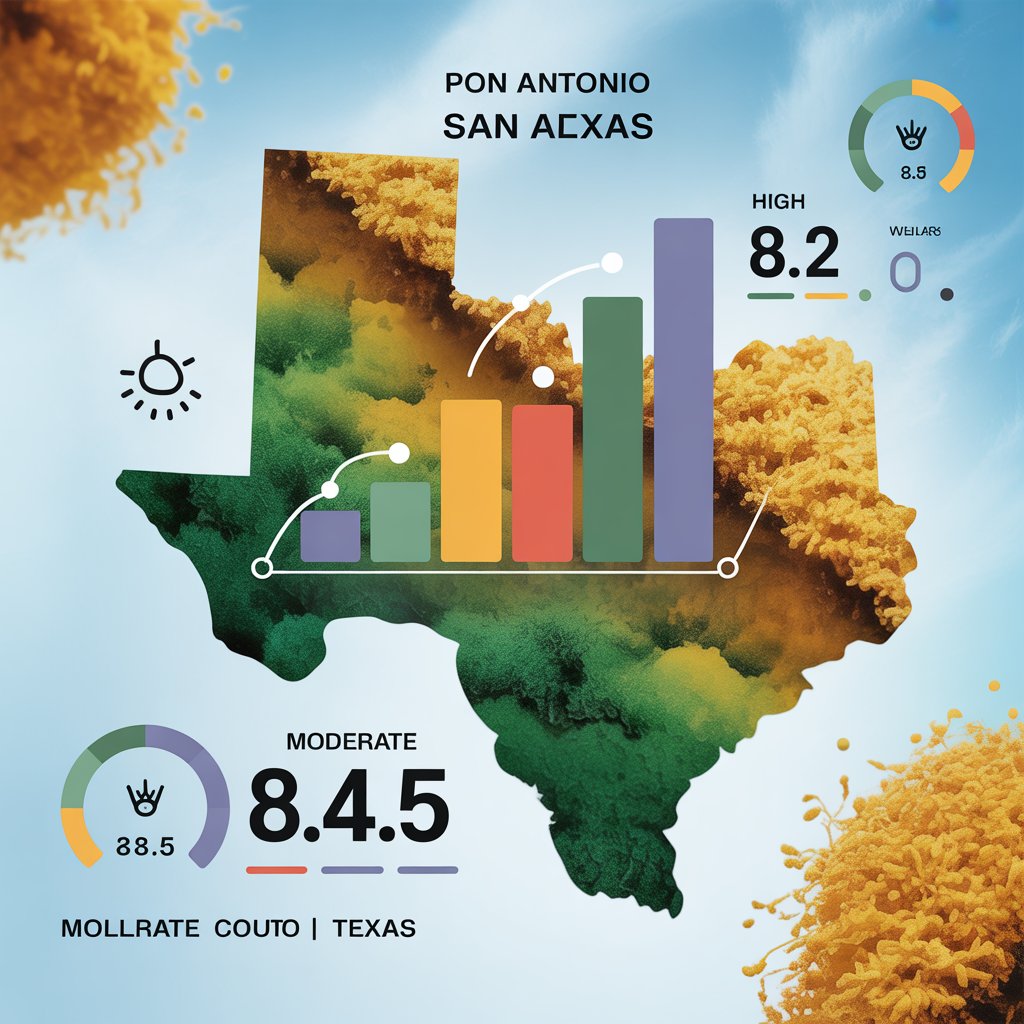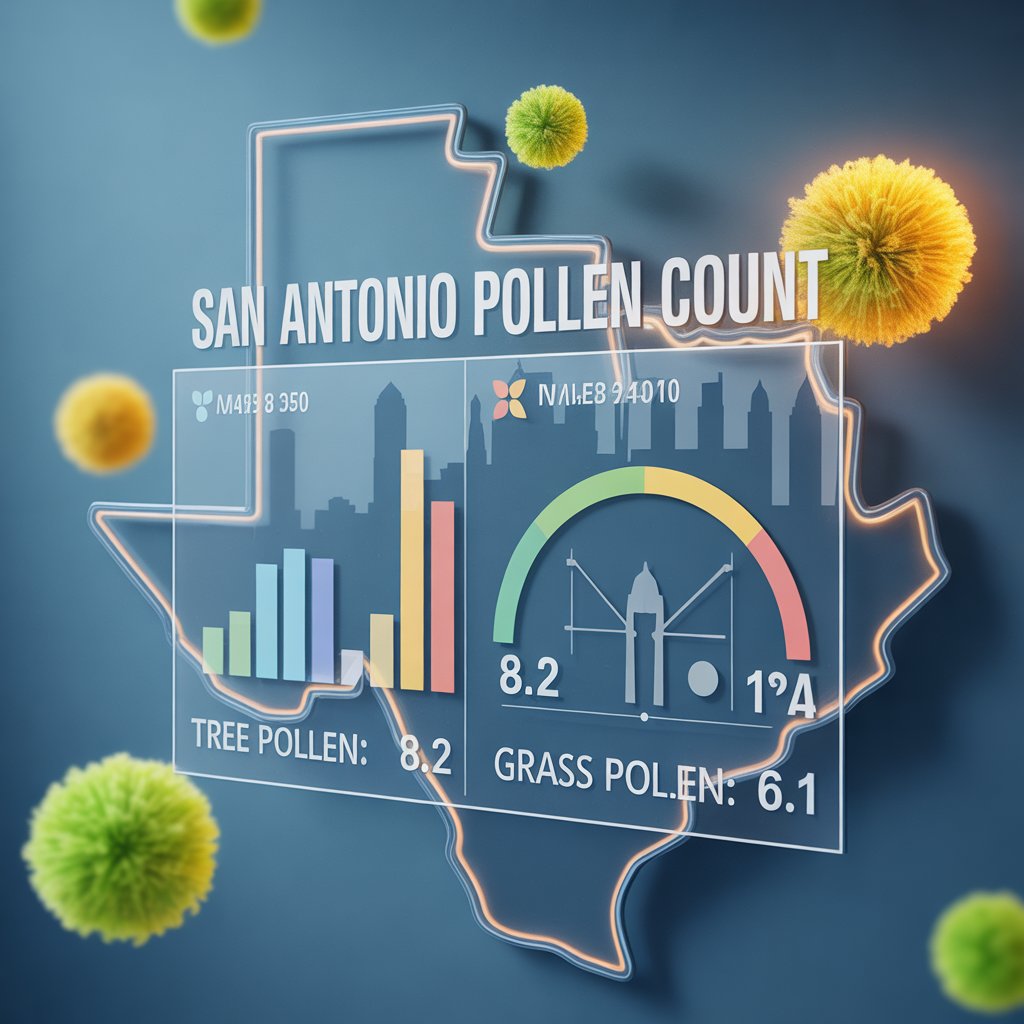When spring or fall arrives, residents of South Texas start searching online for one specific term — pollen count San Antonio. Whether you’re sneezing, dealing with watery eyes, or simply want to know what allergens are in the air, understanding the pollen count is the first step to staying healthy and comfortable.
In this detailed guide, we’ll explore what pollen count means, why pollen count San Antonio is often high, how you can track it, and what you can do to reduce allergy symptoms.
What Is Pollen Count?
Before we focus on pollen count San Antonio, it’s important to understand what a pollen count actually measures.
Pollen count refers to the measurement of pollen particles in a specific volume of air over a 24-hour period. The number is expressed as grains of pollen per cubic meter.
Meteorologists and allergists use specialized instruments to trap airborne pollen. The results help determine the severity of allergy conditions for the day — whether it’s a low, moderate, high, or very high pollen level.
In cities like San Antonio, pollen counts play a big role in daily life, especially during certain times of the year when cedar and oak pollen dominate the air.
Why Is Pollen Count San Antonio So High?
People often wonder why pollen count San Antonio remains high compared to other cities in Texas or the U.S. The answer lies in the region’s unique climate, vegetation, and geography.
1. Climate Factors
San Antonio has a humid subtropical climate — meaning it experiences warm, wet springs and dry winters. This combination encourages many native plants and trees to release pollen year-round.
2. Vegetation and Trees
San Antonio is surrounded by plants that are notorious for triggering allergies:
-
Mountain Cedar (Ashe Juniper)
-
Oak Trees
-
Ragweed
-
Mulberry
-
Elm
These plants release microscopic pollen grains that travel long distances through the wind, causing widespread allergic reactions.
3. Hill Country Effect
The Texas Hill Country—which borders San Antonio—is home to vast forests of cedar trees. Each winter, cedar trees release a massive amount of pollen, turning the sky hazy. This phenomenon is famously known as “Cedar Fever.”
Seasonal Breakdown of Pollen Count San Antonio
Understanding the seasonal patterns of pollen count San Antonio helps you prepare for allergy flare-ups before they happen.
Winter (December – February): Cedar Season
During this time, the mountain cedar trees dominate the pollen scene. The pollen count San Antonio often skyrockets to extreme levels.
Symptoms include:
-
Runny nose
-
Sore throat
-
Watery eyes
-
Fatigue
Locals call this period “Cedar Fever Season.”
Spring (March – May): Oak and Ash Pollen
As winter fades, oak trees start releasing pollen. Oak pollen is light and can travel far, which means even those living miles away can feel its effects.
During spring, the pollen count San Antonio remains consistently high.
Summer (June – August): Grass Pollen
While the pollen levels dip slightly, grass pollen from Bermuda and Timothy grass keeps allergy sufferers on alert.
Fall (September – November): Ragweed and Mold
Ragweed blooms in late summer and thrives in early fall. Combined with mold spores from rain and humidity, fall can be another challenging time for allergy sufferers in San Antonio.
How to Check Pollen Count San Antonio Daily
Staying informed is key to managing allergies. Here are reliable sources to check the pollen count San Antonio every day:
-
The Weather Channel Allergy Tracker – Offers daily forecasts and pollen alerts.
-
Pollen.com – A detailed resource providing a 5-day pollen forecast.
-
Texas Allergy, Asthma, and Immunology Society – Provides official local pollen counts.
-
Local News Channels (KSAT, KENS5, WOAI) – Report morning and evening pollen updates.
-
Mobile Apps – Apps like “My Pollen Forecast” and “Zyrtec AllergyCast” send alerts based on your location.
Checking the pollen count San Antonio before heading outdoors can help you decide whether to take medication or limit outdoor exposure.
Common Allergens Behind Pollen Count San Antonio
The following allergens are the main contributors to the fluctuating pollen count San Antonio:
| Allergen Type | Peak Season | Common Symptoms |
|---|---|---|
| Mountain Cedar | Winter | Sneezing, fatigue, sore throat |
| Oak | Spring | Congestion, itchy eyes, coughing |
| Ragweed | Fall | Runny nose, itchy throat |
| Grass | Summer | Sneezing, watery eyes |
| Mold | Fall & Spring | Coughing, congestion |
Each allergen has its unique pollen structure, which can affect how severely it triggers allergies in different individuals.
Tips to Manage High Pollen Count San Antonio Days
If you live in or around San Antonio, completely avoiding pollen exposure is nearly impossible. However, these tips can help you minimize symptoms and improve daily comfort.
1. Monitor the Pollen Forecast
Always check pollen count San Antonio updates before going outdoors. Plan your outdoor activities when counts are low, usually early morning or after rainfall.
2. Keep Windows Closed
On high pollen days, keep doors and windows shut — especially in the morning when pollen dispersal peaks.
3. Use Air Purifiers
HEPA-filter air purifiers can remove pollen and dust particles from your home, keeping indoor air cleaner.
4. Shower After Going Outside
Pollen clings to your clothes, hair, and skin. Showering after spending time outdoors helps remove pollen and prevents nighttime allergy flare-ups.
5. Wash Bedding Frequently
Use hot water to wash sheets and pillowcases weekly. Pollen that enters your home can settle on bedding.
6. Take Allergy Medication
Over-the-counter antihistamines like Claritin, Zyrtec, or Allegra can reduce allergy symptoms. For chronic cases, consult an allergist.
Does Rain Affect Pollen Count San Antonio?
Yes! Rain can have both positive and negative effects on pollen count San Antonio:
-
Before rain: Wind stirs up pollen, raising levels.
-
During rain: Pollen is washed out of the air, temporarily reducing count.
-
After rain: Pollen levels can spike again as plants release more pollen in response to moisture.
Cedar Fever: The Most Notorious Allergy in San Antonio
Among all allergens, cedar pollen has earned legendary status in the region.
What Is Cedar Fever?
Cedar Fever occurs during the winter when Ashe Juniper (mountain cedar) trees release clouds of pollen. Even those who move to San Antonio from other areas often develop cedar allergies after a few years.
Symptoms of Cedar Fever
-
Itchy, watery eyes
-
Sneezing fits
-
Nasal congestion
-
Fatigue and mild fever (hence the name “fever”)
The pollen count San Antonio during cedar season often exceeds 30,000 grains/m³, which is considered extremely high.
How Allergists in San Antonio Help Manage Pollen Allergies
If over-the-counter remedies don’t help, consider visiting an allergist. San Antonio has numerous specialists who can test for specific allergens and provide long-term relief options such as:
-
Allergy shots (immunotherapy)
-
Sublingual tablets
-
Prescription nasal sprays
Allergists can also provide custom treatment plans based on your reaction to the pollen count San Antonio levels.
Impact of Pollen Count San Antonio on Health and Productivity
High pollen counts don’t just make you sneeze — they affect your energy, concentration, and even mood. Studies show that during extreme pollen days, school and work productivity drop significantly due to fatigue, congestion, and lack of sleep.
Businesses and schools in San Antonio often experience a rise in absenteeism during peak allergy seasons.
Environmental and Urban Factors Influencing Pollen Count San Antonio
Urbanization plays a surprising role in pollen trends. With rapid growth, San Antonio’s tree planting programs, parks, and green spaces have increased pollen-producing plants.
Additionally:
-
Air pollution can interact with pollen, making it more potent.
-
Climate change extends pollen seasons, especially for oak and ragweed.
This means the pollen count San Antonio could become even higher in the coming years unless mitigation efforts are made.
Home Remedies to Alleviate Allergy Symptoms
While modern medicine is effective, natural remedies can also help manage mild symptoms caused by pollen count San Antonio spikes:
-
Honey: Local honey may help your body adapt to regional pollen.
-
Saline Nasal Rinses: Clears nasal passages.
-
Steam Inhalation: Eases congestion.
-
Turmeric Tea: Anti-inflammatory properties soothe allergic reactions.
How San Antonio Residents Can Prepare for Pollen Season
Preparation is key. Here’s how you can get ready for allergy seasons based on pollen count San Antonio trends:
-
Stock up on allergy meds before cedar and oak season.
-
Replace HVAC filters regularly.
-
Schedule indoor activities during high-count days.
-
Track local news forecasts for alerts.
Many locals even plan vacations away from Texas Hill Country during peak pollen months — that’s how intense pollen count San Antonio can get!
Future of Allergy Research in San Antonio
Researchers are studying how environmental factors like urban growth, deforestation, and air quality influence the pollen count in San Antonio.
Emerging technologies, including AI-powered pollen trackers and real-time satellite monitoring, will soon allow residents to get hyper-local forecasts and personalized alerts.
As data accuracy improves, predicting pollen count San Antonio will become as common and reliable as checking the weather.
Living Comfortably Despite High Pollen Count San Antonio
It’s possible to live comfortably in San Antonio even with persistent allergens. With preparation, awareness, and lifestyle adjustments, you can minimize the effects of high pollen days.
Always remember:
-
Track daily pollen counts.
-
Use air purifiers.
-
Consult an allergist if symptoms persist.
By staying proactive, you can enjoy all that San Antonio offers — from outdoor trails to festivals — without letting allergies ruin your plans.

Conclusion: Stay Ahead of Pollen Count San Antonio
The pollen count San Antonio is an unavoidable part of life in South Texas, but it doesn’t have to control your comfort. Understanding how pollen levels fluctuate and taking preventive steps can help you stay healthy throughout the year.
Whether you’re a lifelong resident or new to the area, checking pollen count San Antonio daily and managing your environment can make a huge difference in your quality of life.
So next time you step outside and feel a sneeze coming on, remember — it’s not just the weather, it’s the pollen count San Antonio

